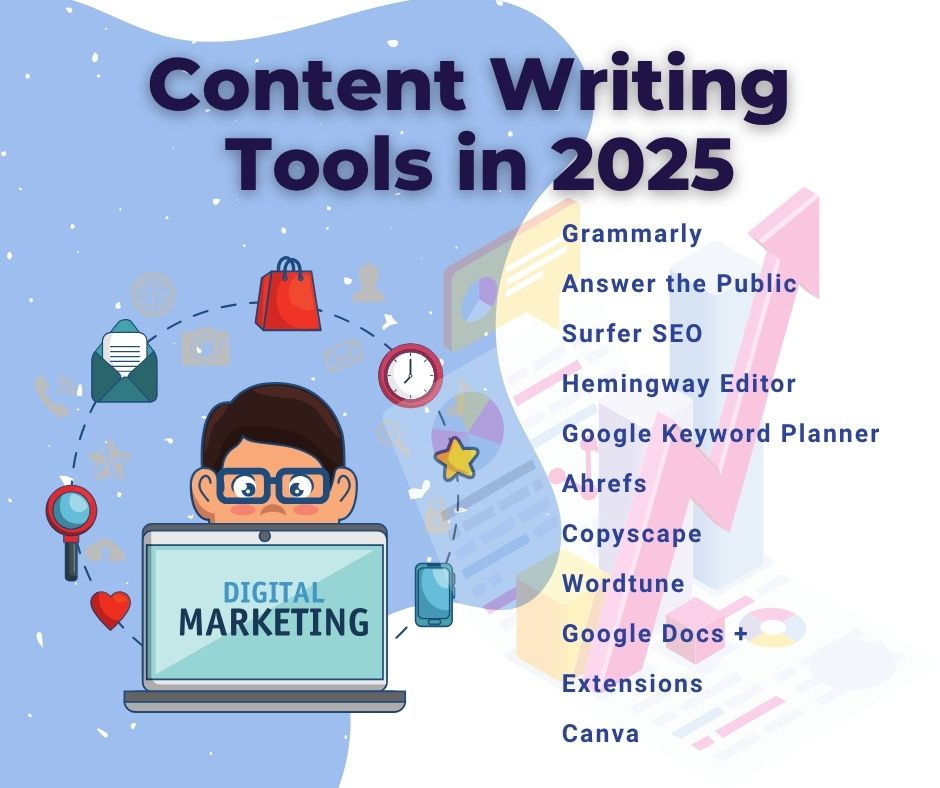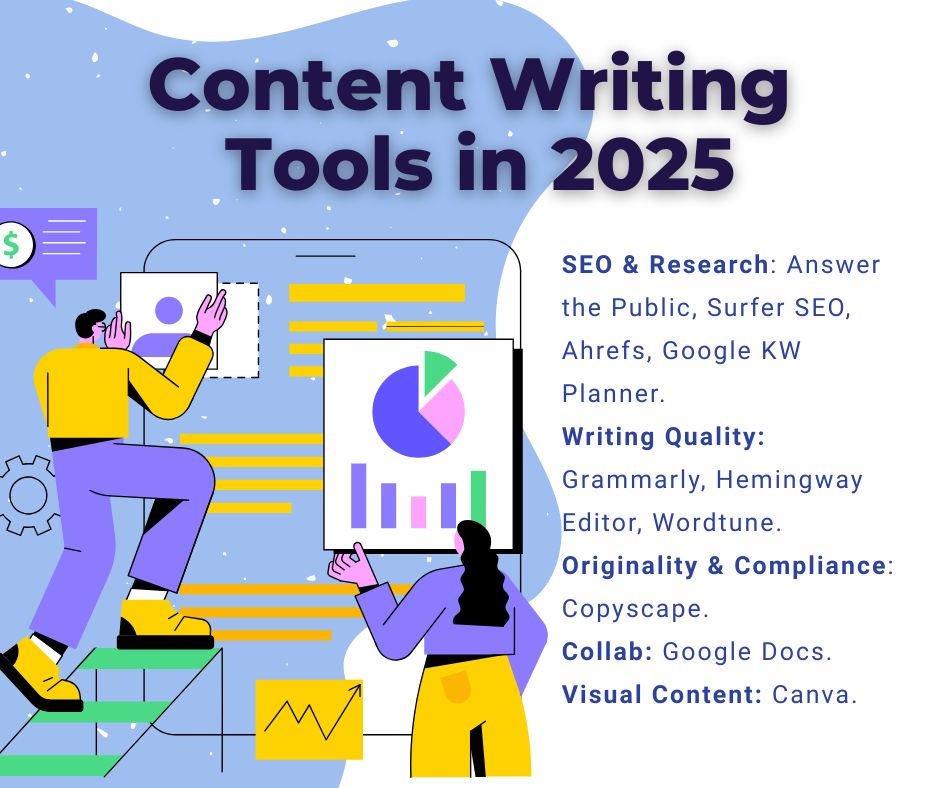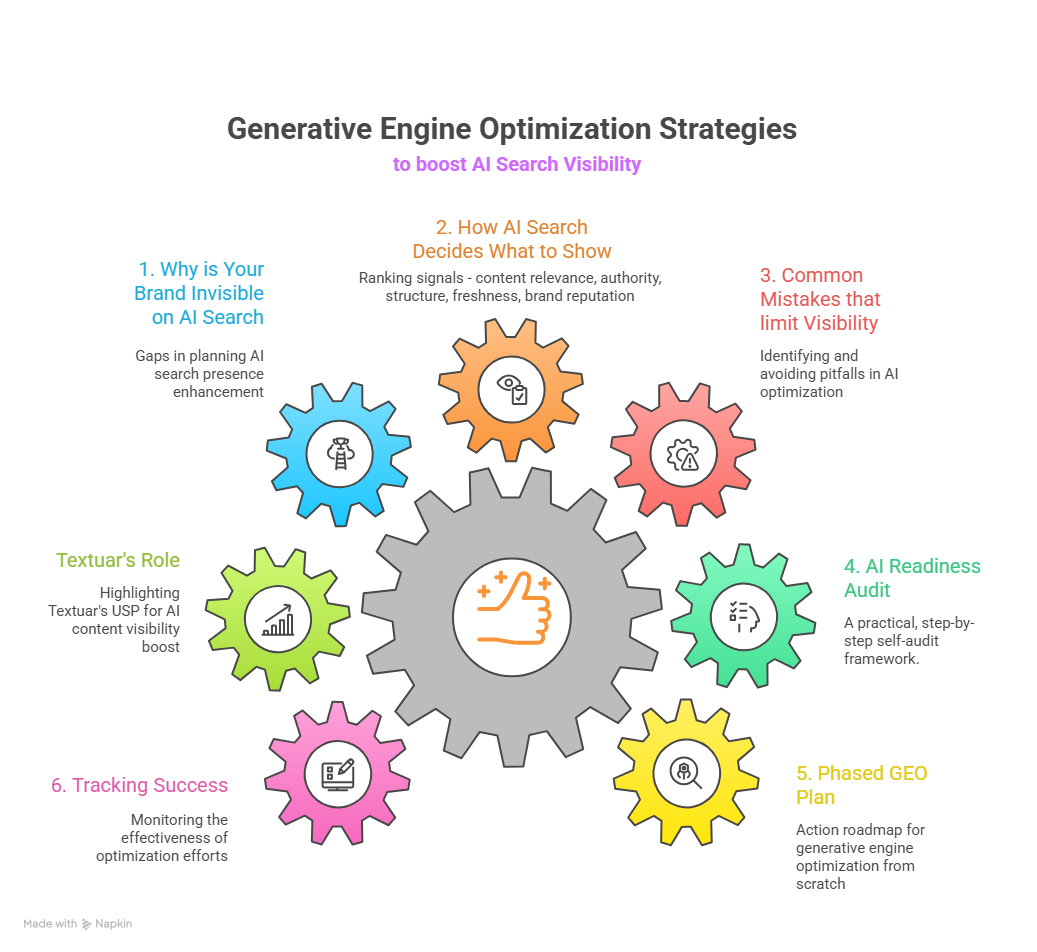📌 TL;DR Summary- What is Covered?
The best content writing tools for businesses in 2026 help you write faster, rank higher, and maintain quality at scale.
Top tools:
- Grammarly, Hemingway, Wordtune – polish grammar, clarity, tone, and readability.
- Surfer SEO, Ahrefs, Google Keyword Planner, AnswerThePublic – plan topics, find keywords, and optimize for SEO.
- Copyscape – ensure originality and protect your brand.
- Google Docs + extensions – real-time collaboration.
- Canva – add on-brand visuals to content.
- Quillbot and ZeroGPT– AI detection
Use them smartly:
Let tools assist, not replace human judgment. Combine multiple tools (SEO + editing + plagiarism check), customize output to your brand voice, learn shortcuts, and always do a final human edit before publishing.
Content teams have emerged as a powerful marketing accelerant. Businesses that aren’t using content at scale are losing market share to competitors. Perhaps this is why content writers have pressing responsibilities of creating compelling content that is SEO-optimized and engages readers. But this overburdening leads to rushed jobs and inefficiencies at work. This problem can be mitigated to a great extent with the help of the best content writing tools for business in 2026.
These tools can save a lot of hours for the content writer. In addition, they can help the final draft to be sharper and more riveting to read.
Let us look at the top content writing tools and how to harness maximum value from them in the content production space.
What are Content Writing Tools?
Content companies use software applications to improve their efficiency and productivity at work. Such content writing tools make it easier for businesses to create quality and valuable content in bigger volumes for their SEO and visibility boosting needs.
The tools automate a lot of the writing tasks like:
– grammar checking,
– SEO optimization,
– plagiarism detection, and
– readability analysis.
Using these tools help the writers to convert manual content writing workflows into efficient, data-driven operations that deliver measurable results.
Stay away from problems like diminishing brand equity or lost organic traffic with the help of content writing tools.
What are the Benefits of Content Writing Tools?
Over the last many years, content marketing has evolved substantially. Blogs, social media posts, and email newsletters are used by a lot of businesses to communicate with their audience. Yet, the work behind this content is not necessarily easy.
Writers need to come up with great ideas. They have to write, edit, and ensure that the content is searchable and works for search engines. They must also ensure that the content is natural-sounding and easy to read.
This is where content writing tools come in handy. They can help you come up with ideas for topics and support you through every step of the process. They also assist with grammar checks and readability improvement. Some tools even allow you to write SEO-friendly content. Others help in incorporating visuals in your content.
By using these software tools, you can:
- Write faster and more efficiently.
- Easily catch grammar or spelling errors.
- Improve the ranking of your content on search engines.
- Reduce expenditure on keyword research and editing.
- Collaborate more effectively with your team.
These are not tools reserved for professional writers. Beginners can use them to improve their writing. With the right combination of tools, your content can be informative and valuable.
Which are the Best Content Writing Tools for Business in 2026?
Here is a list of the best content writing tools for business in 2026 that may help you right from the beginning of your content-creation process.
| Tool | Key Features | Why It Matters | Best For |
| Grammarly | Spelling/grammar checker, tone detection, readability improvements | Enhances professionalism and clarity in writing | Bloggers, marketers, students, businesses |
| Answer the Public | Visual keyword tool showing real user questions/comparisons | Uncovers audience intent for SEO-focused content | SEO writers, bloggers, customer-centric content creators |
| Surfer SEO | Content optimization, keyword suggestions, structure advice based on top pages | Data-driven SEO improvements for higher rankings | SEO teams, bloggers, agencies |
| Hemingway Editor | Highlights complex sentences, passive voice, and readability (Grade 6-8 ideal) | Ensures clear, concise, and engaging content | Content writers, marketers, customer guides |
| Google Keyword Planner | Free keyword research tool with search volume/difficulty metrics | Identifies high-potential keywords for content planning | SEO beginners/experts, ad copywriters |
| Ahrefs | Competitor analysis, backlink checks, keyword research, content explorer | Comprehensive SEO insights for traffic growth | SEO specialists, agencies, content teams |
| Copyscape | Plagiarism detection to ensure content originality | Protects brand reputation and SEO rankings | Freelancers, editors, publishers |
| Wordtune | AI-powered sentence rewriting for clarity/conciseness | Improves flow and tone without losing meaning | Students, marketers, social media writers |
| Google Docs + Extensions | Cloud-based collaboration with Grammarly/Wordtune integrations | Streamlines team editing and real-time feedback | Remote teams, collaborative writers |
| Canva | Drag-and-drop design tool for graphics, infographics, and branded visuals | Creates engaging visuals without design expertise | Bloggers, marketers, social media managers |
| Quillbot and ZeroGPT | Quickly identify AI content and humanize them for human readers | Prevents costly search algorithm penalties for thin or robotic content | Content writers, marketers, freelancers |
Let us explore these tools in detail.
1. Grammarly
Grammarly is a smart writing assistant that proofreads your spelling, grammar, punctuation, and so on. It even looks at sentence simplicity, word choice, and tone. You can set goals such as getting your writing to sound formal, friendly, or confident. If you use AI content writing tools, then make sure to pass the content through Grammarly.
The tool operates within your browser and also on Google Docs and Word. The tone detector can help you match your work to your target audience. It allows the reader to believe that your content is just correct.
Why it matters: Even the most proficient writers overlook small mistakes. Grammarly allows you to correct them before others notice. It also uplifts how your content sounds. You don’t merely correct errors — you enhance the flow of your writing.
Best for: Bloggers, marketers, businesses, and students. It’s perfect for writers who need their content to sound crisp, readable, and professional.
2. Answer the Public
Answer the Public is a keyword tool with a twist. This is one of the best SEO writing tools. It turns search data into visual maps full of questions, comparisons, and phrases real people actually ask on Google.
You enter a word, and it displays what people want to know. Utilize it to organize topic clusters. Plus, you can also collect related questions and compose in-depth posts covering each topic extensively. You need not use AI content writing tools for your topic ideation purpose if you use Answer the Public.
Why it’s important: This tool allows you to better understand your target audience. You can find out the very questions they have. It’s wonderful for blog topics, FAQ pages, and content that answers real needs.
Best used by: Writers who desire to produce helpful and useful content. It’s ideal for SEO, customer-oriented blogs, and educational articles.
Get more details on the tool- Supercharge Blog Writing Research with ‘Answer The Public’
3. Surfer SEO
Surfer SEO assists you in writing content that Google likes. You input a keyword, and it analyzes your work compared to top search pages. Then, it provides you with a content score, keyword recommendations, and structure advice. You can compose directly within its editor or utilize the Google Docs plugin.
Why it matters: Surfer SEO eliminates the guessing game of SEO. You won’t have to guess how many keywords to use or how long your post needs to be. It informs you on exactly what to do based on actual data.
Best suited for: SEO teams, bloggers, and agencies. It’s perfect for people who want improved rankings without having to hire a full-time SEO expert.
Pro Tip: Don’t simply use the keyword suggestions without thinking. Write in your own voice, but have the SEO tips as a guide.
4. Hemingway Editor
The Hemingway Editor ensures that your text is easy to read. It identifies long sentences, passive voice, and complex words. It also provides you with a readability score based on grade level. The lower the grade, the more readable the text is.
You must aim for Grade 6 to 8 level to ensure readability for a universal audience. That way, even people in a hurry or on mobile can understand your message quickly.
Why it’s important: Your readers will lose interest if your sentences are long or confusing. Hemingway guides you to keep things simple and to the point. It’s handy for any kind of writing — blogs, emails, reports, and so on.
Best for: Content writers who would like their writing to be sharp and easy to read. It’s excellent for websites, product descriptions, and customer guides.
5. Google Keyword Planner
Google Keyword Planner is a free tool from Google Ads. It gives you an indication of how frequently people look for a word or phrase and how difficult it is to rank with it. You can also get keyword ideas related to your subject. Its immense value makes it one of the leading best content writing tools for business in 2026.
Why it matters: Brilliant content begins with smart keyword decisions. Google Keyword Planner provides you with actual search data from Google itself. Plus, this allows you to create content that answers what people are looking for.
Best suited for: SEO newbies and experts, too. It’s perfect for writers planning out blog posts, ad copy, and landing pages.
Pro Tip: You should search for low-competition, high-volume keywords. They provide you with the greatest opportunity to rank without advertising.

6. Ahrefs
Ahrefs is an SEO powerhouse tool. It includes evaluation of competitors, rank tracking, backlink checks, and keyword research tools. You can view which content receives the most traffic and how your site compares to others. Use the Content Explorer to find popular content in your niche. Then, write something even better and promote it.
Why it’s important: Ahrefs puts everything you need to know about SEO into context. You can view what content performs, what links are important, and what your competitors are up to. It’s having a complete SEO team within one tool.
Best suited for: SEO specialists, agencies, and content teams that have a major emphasis on ranking and traffic.
7. Copyscape
Copyscape is among the best plagiarism checkers. It scans your writing against content throughout the web. If it identifies similarities, it marks them. This allows you to correct or rephrase anything that seems to be copied. However, you should run it on every article before publication, even if you trust the writer. It’s a quick step that safeguards your brand.
Why it matters: For SEO and trust, original content is crucial. Both your brand and your rankings may suffer from duplicate content. Copyscape guarantees the safety and cleanliness of your work.
Best for: Freelancers, editors, agencies, and anyone publishing online content.
8. Wordtune
Wordtune assists you in rewriting your sentences better. It displays smarter, succinct, or structured versions of your writing. You can also make your writing shorter or longer with one click. However, don’t implement all the suggestions. Pick the one that suits your style. Always re-read to maintain your natural tone.
Why it’s important: Your words sometimes don’t quite sound right. Wordtune presents new alternatives that enable you to state things clearly and correctly. It is particularly helpful when you are editing or writing in a hurry.
Best suited for: Students, writers, and marketers. It’s ideal for email writing, blog editing, and enhancing social media posts. It is also suitable for writers who wish to speed up their workflow.
9. Google Docs + Extensions
Google Docs is a cloud-based word processor. It allows you to write and edit your documents online. You can share your work with others, comment, suggest changes, and collaborate in real-time. With extensions such as Grammarly, Wordtune, and Voice Typing, it has become much more powerful.
Why it matters: Collaboration is made simpler. You don’t have to email files back and forth. They all view the same document. It also auto-saves, so you don’t lose anything.
Best for: Teams, remote employees, and writers who need immediate feedback.
Pro Tip: Use “Suggesting” mode when editing someone’s work. It allows them to see your changes and approve or reject them.
10. Canva
Canva has been regularly featuring in our list of the best content writing tools for business in 2026. The tool assists you in designing graphics without requiring designing skills. You can create blog headings, social media posts, infographics, eBooks, and more. There are templates for all content types. However, be consistent in your fonts and colors. Save your brand style using Canva’s Brand Kit feature and apply it across designs.
Why it’s important: An effective image can command attention and clarify complicated concepts. You can include visuals that align with your writing easily using Canva. You do not require Photoshop or a designer.
Best suited for: Bloggers, marketers, and anyone sharing content online.
11. QuillBot and ZeroGPT
QuillBot is an AI writing, AI detection and paraphrasing tool. It helps humanize technology content, improve clarity, word choice, and the efficacy of a draft content. Another tool is ZeroGPT, an AI content detector that instantly can determine if a piece of text is AI. This enables businesses to keep it real, and stay on the right side of search engines or academic services. When combined together, they allow writers to improve tone, reword robotic or monotonous text, and ensure that the final document sounds convincingly human and is truly original and audience-friendly content.
Why it’s important: These tools help maintain credibllity and trusy. also with it, your business can avoid hefty search penalties for thin, shallow and AI content.
Best suited for: Content writers, marketers, freelancers
How to Make the Most of Content Writing Tools?
Using the best content writing tools for business in 2026 can simplify the complex and labour-intensive work of writing content that generates revenues. They allow you to complete tasks more quickly and with better results. You should always use them in the best possible way. Let us tell you how to make the most of them.
1. Automation Should Not Be the Only Reliable Tool
AI can correct grammar, or it can rephrase entire sentences for you. Still, they have their own issues. They do not recognize the tone you use or who your audience is. Therefore, always go through your content after using any tool. Make sure the text flows well and matches the tone of your brand. Use tools as assistants—not substitutes.
2. Combine Different Tools
Every tool is designed for a particular purpose. Grammarly is able to specify grammar and spelling errors. Surfer SEO helps your pages rank higher on search engines. Copyscape enables you to find copied content. Pick the right tool for the specific needs of your content. Using this technique gives better results. You can take a cue from the best content writing tools for business in 2026 listed above.
3. Customize Output to Your Brand
AI text tends to be without personality. Always check the content and make any necessary changes. The tone and message used in your content should be in line with your brand. In addition, include your own stories or examples to make the information easier to connect with.
4. Learn Shortcuts and Functions
You may not realize that most tools have useful features built in. As an example, Grammarly can detect the tone of your writing. You can write in Google Docs by using your voice. Take a moment to study these features. This can save you time when writing.
How to Choose a Good Content Writer?
Hiring the best content writer is equally as important as finding the best tools. A great writer can leverage tools to improve their writing but also know when to trust themselves. Here’s how to find the best for your company:
1. Expertise in the Best Content Writing Tools for Business in 2026
A good writer would be aware of using tools such as Grammarly, Hemingway, or Surfer SEO. These tools assist in making grammar, style, and SEO improvements. Ask them what tools they use to write and how they use them. A good writer will explain you in detail.
2. Check Writing Skills
Tools can’t make good out of bad content. So, always check the writer’s portfolio. Check the content, which should be easy to read, clear, and engrossing. The tone should be in line with your brand and audience. If their samples are dull or difficult to comprehend, they may not be suited for you.
3. Ask About SEO Expertise
Even amazing content is irrelevant if it doesn’t appear in search results online. Ensure that your writer has a grasp of SEO fundamentals. Also, they should know how to use keywords naturally and structure content to appease Google. Request them to provide you with examples of content that has performed well in search results.
4. Ask Smart Interview Questions
Ask them these questions:
- What writing tools do you use?
- Can you improve or edit this paragraph using Hemingway?
- How do you ensure your content is SEO-friendly and unique?
Final thoughts
It does take effort and time to write good content. Yet the best tools can save you time and assist you in writing even better. These content writing tools help you with grammar, ideas, SEO, visuals, and much more. They reduce the writing process to a much faster and easier format.
When you correctly use these tools, your content becomes more effective and clearer. You don’t merely write more, but you write better.
Combining the best content writing tools for business in 2026 with talented writers brings even more superior results. So, whether you write yourself or outsource, ensure that the tools will be included in your strategy.
Try out a couple of tools from this list. Plus, find out what works for you. And if you want expert assistance, Textuar offers writers who are good at using these tools. They can assist your content in reaching its best.
Ready to upgrade your writing process? Start testing these tools today, or hire Textuar for your content writing needs and watch your content game improve.
Best Content Writing Tools FAQs
Q. Do I have to use all of the tools?
No, you can’t use it all at the same time. Get a couple of basic tools for now and add new ones as your workflow increases.
Q. Are these tools able to write content on my behalf?
Although tools can propose various drafts or suggestions, you are still needed to review and edit them. Every piece of content should be checked and edited by a human before publishing.
Q. Can I use the best content writing tools 2026 without paying anything?
You can use most tools for free, although they only have basic options. You may start with them and switch to paid plans whenever you require more advanced options.
Q. Are content tools capable of replacing human writers?
No, they won’t do that. Writing tools exist to help, but they cannot replace the imagination, feelings, and judgment that only writers have.
Q. How often should I use these tools?
Use them regularly when you write, edit, or plan your speech. The more you use them, the more quickly you’ll improve and the better your writing will get.










